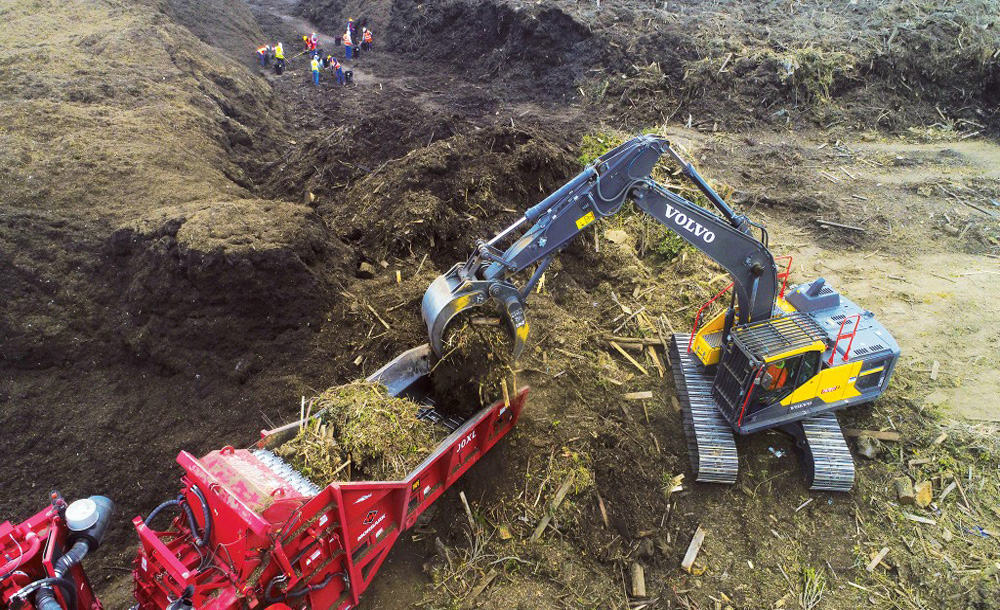Just over an hour west of Los Angeles, in Oxnard, a material handling company is hard at work turning scrap branches and composted material into soil-enhancing products.
Agromin is celebrating 50 years in business in 2022 and has grown from tree trimming and turning that debris into mulch to processing more than 1 million tons of material annually.
The company now serves cities and jurisdictions from northern California to the Mexico border, processing their green waste, food waste, wood waste, and agricultural byproducts into premium soils, compost, and mulch which then goes to farmers, landscapers, and homeowners.
“We make over 200 custom soil blends for various needs,” said Dave Green, chief operating officer at Agromin. “The Super Bowl was recently in southern California, and we serviced SoFi Stadium, mulching and beautifying the grounds for that event.”
The team also prides themselves on being part of the solution in reducing or diverting emissions.
“We are on a mission to lessen the impacts of climate change,” said Green. “We collect and process materials that would otherwise be in landfills creating greenhouse gasses, and we transform them into compost and mulch to put that carbon and methane into the soil instead of the air. This also saves water, supports better yields, and makes farmers less dependent on fertilizers.”
Another part of the process where Agromin is working to reduce their carbon footprint is their equipment. The team felt their older equipment was using too much diesel, which runs counter to their sustainability goals and their place as a leader in a largely green industry.
“Agromin called me, fed up with their current machine provider’s poor service and fuel efficiency,” said Craig Harrison, Agromin’s Volvo Construction Equipment outside sales rep. “We discussed their needs and the fact that they like to try equipment before buying, so we set them up with a rental purchase agreement for Volvo wheel loaders and an excavator that gave them six months to check things out.”
Agromin was under no obligation to buy the machines, but they did so at the end of the six months.
“This is my twenty-third year with Agromin, so I’ve seen and tried all the brands of wheel loaders and excavators,” said Green. “In terms of price, uptime, and the customer care we’ve had with Volvo, we don’t need to try anything else.”
Achieving major growth in the organics sector
Agromin started out in the 1970s turning tree trimmings into mulch, but mandates on recycling pushed them even further in the 1990s. Since 1993, the company has jumped from recycling 10,000 tons of green waste per year from one city to processing more than 1 million tons from more than 200 locations.
Their process begins when local waste haulers bring green and food waste to Agromin sites. Non-recyclable materials are sorted out, and the rest is ground up and mounded into windrows that are turned and watered for two months. Microorganisms – not chemicals – naturally compost the material, which helps the soil produce healthier plants and sequester more carbon.
Agromin uses a Volvo EC220 crawler excavator to put material into their grinding machines, where a Volvo L90 wheel loader then manages the ground-up material and puts it into windrows. A larger L110 wheel loader helps load trucks and moves heavier material when needed.
“The fuel consumption is a lot better than some units we had in the past,” said German Cervantes, Agromin’s facility manager. “One of the main things we need is reliable equipment because material never stops coming in, and Volvo uptime has been outstanding.”
Cervantes says they also take advantage of advanced telematics.
“Any time there’s something wrong with a machine, we get a call saying something like, ‘This machine is hot and you need a new radiator fan belt,’ and they can send a technician and part right away to minimize downtime.”
The operators working day-to-day enjoy the equipment as well, noting comfort, ease of use, and simple maintenance access. The team uses Volvo Load Assist on the wheel loaders, an app on the in-cab tablet that includes an on-board weighing feature.
“That saves us a lot of time because we know the weight of the material in the bucket without needing a scale on-site,” said Cervantes.
The OEM relationship has also remained important. Green says their rep Harrison, or someone from his team, will stop by regularly to see if there are any efficiencies that can be gained or older equipment that could be traded toward a better-fitting machine. The sales team also gets telematics alerts on Agromin’s machines so they can follow up if needed.
A green future
Not many industries can be green from the beginning to the end of their processes, but Agromin is certainly working toward it.
In their first 50 years, the team has diverted more than 6 million tons of green materials from landfills, which is the equivalent of removing CO₂ emissions from 1.9 million cars annually. They’ve also won multiple climate change, recycling, and small business awards.
Agromin wants to do even more, though, and is strongly considering adding electric machines to their lineup, such as the zero-emission electric compact excavators and wheel loaders from Volvo.
“We’re really proud to be part of a system where a homeowner can put out their barrel of yard waste, and in 45 or 60 days we can actually return it back to the earth on a farm that can grow the food they will eat,” said Green. “If we can have equipment that’s more sustainable too, that makes it even better.”
Emily Fouche is a senior content and public relations specialist at Volvo Construction Equipment.

